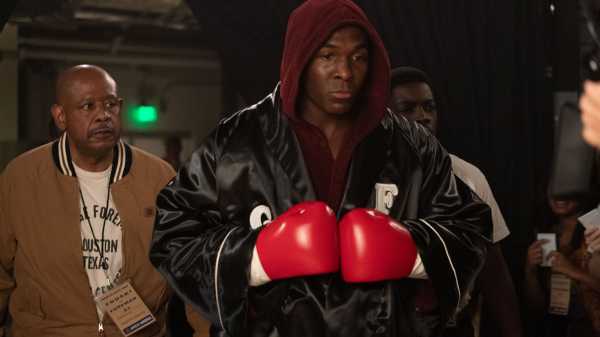
With “Big George Foreman,” the director George Tillman, Jr., accepts the challenge of depicting a protagonist who is also, essentially, his boss—this is a bio-pic of a celebrity who is also one of its executive producers. Tillman tells the story in a way that divides along practical and artistic lines. The story of young George’s childhood and rise to fame has a tense and turbulent charm, but the story of the professional heavyweight’s dash to the championship and everything that follows (up through the nineteen-nineties) has a whiff of a ghostwritten corporate autobiography.
The film begins with eleven-year-old George (Kei Rawlins) moving, with his mother and siblings, to a house in Houston’s Fifth Ward, amid difficult circumstances. Tillman presents these family difficulties with a sharply observed array of details that stand out piercingly from the drama that they spark; the cinematic extrusion of these details is its main aesthetic delight. The driver who brought them there, seeing the handful of change that’s all George’s mother (Sonja Sohn) has, sadly and kindly refuses it. The house is in a state of dire disrepair, but she’s ready to fix it up; she tells them they’ll get electricity when she can afford it; dinner by lantern is a single hamburger that she divides among the children, whom she exhorts to pray to give thanks for what they’ve got. (The others do; George stays silent.) George sleeps on the floor; he wears tattered clothing to his segregated school, for which his white teacher disdains him. George has no lunch to bring because the family can’t afford it. When a classmate mocks his poverty, George pummels him bloody. The bright and eager George is rendered taciturn by his sense of difference and embittered by the cruelty that he faces.
Nancy asks two things of him: to control his fighting and to thank God for the family’s blessings. But George is overcome by rage and uses his formidable strength to sustain his pride. He perceives little to be grateful for, dismissing religion and putting faith in his own efforts, such as they are. Here, too, the details that Tillman brings to life are vivid and invigorating. A few years later, the teen-age George (Austin David Jones) is a petty criminal; after rolling a drunk man, he’s chased by the cops, and Tillman, as in his previous film, “The Hate U Give,” finely observes the terror in the presence of the police that’s a constant of Black life. George saves himself by smearing himself with filth from a sewage pipe, a humiliating maneuver that sparks an effort to seek a new life. Joining the federal Job Corps—a residential program founded in 1964 as part of the so-called War on Poverty—George is sent to a training camp in California and seeks to learn a trade. In the barracks, he sleeps in a bed for the first time; his mother surprises him with a new pair of Chuck Taylors, which he cherishes. When his sneakers are stolen, he gets in a fight and risks expulsion, but is instead taken under the wing of one of the program’s officials, Doc Broadus (Forest Whitaker).
Doc, a former boxer, runs a boxing program at the Corps. There, he teaches George that boxing isn’t fighting—it’s “a sport with rules.” Whitaker’s scenes are the high points of “Big George Foreman”; the actor invests his character with a depth of experience that gives the film its essential source of dramatic power. The transformation in George’s life is distilled in the kind of scene that was missing from “Creed III” and that, to my mind, is the very essence of a boxing movie: the teaching and mastery of the sport’s physical skills. Tillman pays special attention to the dancelike footwork at the basis of boxing, and does so with a quasi-documentary fervor. (I was reminded of Frederick Wiseman’s great documentary “Boxing Gym.”) Above all, he shapes the story of George’s rise as a drama of mentorship, of a Black man by Black men; the film makes clear that George’s life is saved by the presence of a sympathetic, understanding Black man in a position of authority.
George’s mother is appalled that he plans to devote his life to violence and asks God to help him; in response, George asks what God has to do with it. George, driven by the urgency of personal and familial need and his own inner fury, wants to make it big, fast. By 1967, Doc sets forth a five-year plan to get George (played as an adult by Khris Davis) into the Olympics in 1972; instead, George sets his goal on the 1968 Olympics, in Mexico City, where he indeed wins the gold medal in the heavyweight division. I remember watching the bout as a child (I used to watch boxing on TV with my father), and I remember vividly its political implications. At the same Olympic games, two Black medal winners, the track stars Tommie Smith and John Carlos, stood with their fists in the air, in a gesture of protest, on the awards podium, resulting in an absurd firestorm of criticism; they were then expelled from the team. When Foreman won his final match, he waved a small American flag in the ring, a gesture that was widely taken to be an anti-protest—a gesture of patriotic pride and unity. In “Big George Foreman,” George resents the idea of being considered a sellout, and the criticism spurs him to even more furious exertions in pursuit of his ultimate goal: the heavyweight championship of the world.
There, too, Tillman extends the theme of mentorship. George, moving to Oakland, finds his team augmented by the presence of the former champion Archie Moore (Lawrence Gilliard, Jr.) and the trainer Dick Sadler (Dwayne Barnes), who had trained Moore and Sonny Liston (Cedric Boswell). (Moore delivers an extraordinary monologue, one that echoes throughout the film, about the psychology of boxing and the existential isolation of a bout’s two opponents.) Unfortunately, that’s where the movie splits down the middle: Foreman wins the championship, beating Joe Frazier (Carlos Takam) on January 22, 1973 (by remarkable coincidence, the very day that Roe v. Wade was decided and that Lyndon Johnson died). The rest of his career, and his life story, is telescoped in an unseemly rush.
George marries Paula (a fictional character, played by Shein Mompremier), has affairs with other women, and the couple divorces. He makes lots of money and maintains a proud and pugnacious quasi-atheism of self-reliance. (When, at the freshly crowned champion’s lavish new house, his mother calls for a prayer of thanks for the food, George retorts that he, not God, bought the food.) He loses to Muhammad Ali (played by Sullivan Jones) in the Rumble in the Jungle (where Ali applied the celebrated “rope-a-dope” strategy, coaxing George to exhaust himself early). It’s clear that, as a boxer, George was never the same after that, but the movie makes almost nothing of what may have happened to him as a result, physically or mentally. “Big George Foreman” is strong in depicting the outer life of the boxer, but when his conflicts are internal, the movie can’t meet sterner artistic demands. The failure is all the more egregious after George loses to Jimmy Young (David Jite), in 1977, and has a near-death experience in the dressing room after the fight; he then has a religious epiphany and decides to leave boxing and become a preacher, to his mother’s delight.
At that point, Davis himself seems transformed, even as the character of George becomes more distant than ever. The drama of religious devotion is an exalted one, a cosmic one, and it places exceptional demands on a filmmaker, whether with the sublimity of Dreyer’s “Ordet” or the joy of Rossellini’s “The Flowers of St. Francis” or the fury of Scorsese’s “The Last Temptation of Christ.” But “Big George Foreman” doesn’t bring any special insight to George’s transformation. There’s a fundamental reticence, a seeming self-evidence, to the proceedings that makes the long last stretch of the drama feel more like a promotion of the calling than a bearing of witness to it. George’s concurrent career in his long-familiar public persona of the celebrity, the pitchman, and the businessman is sketched, along with some of the personal tribulations that go along with it. By that point, the energy has long gone out of the movie. ♦
Sourse: newyorker.com






